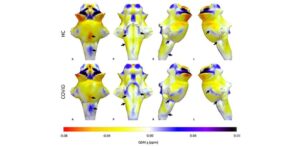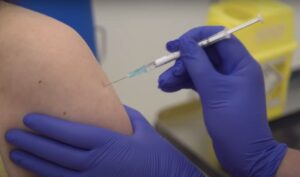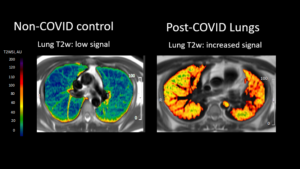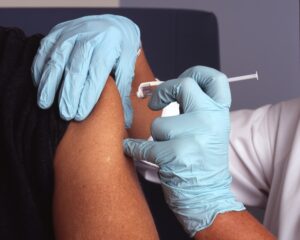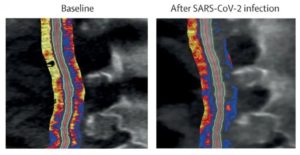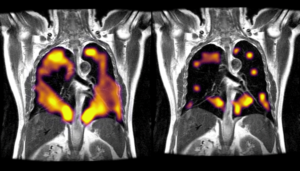Damage to the brainstem – the brain’s ‘control centre’ – is behind long-lasting physical and psychiatric effects of severe COVID-19 infection, a study has suggested. Using ultra-high-resolution scanners that can see the living brain in fine detail, researchers from the Universities of Cambridge ... READ MORE
COVID-19 News
Patient story – Kathryn Hedigan, EXPLAIN study
Kathryn Hedigan took part in the EXPLAIN study, which used hyperpolarised xenon MRI scans to investigate possible lung damage in long COVID patients who had not been hospitalised with COVID-19 but who continued to experience breathlessness. Kathryn, aged 66, lives near Burford in West ... READ MORE
New study reveals long-term mental health risks after COVID-19
A new study has shed light on the long-term mental health consequences of COVID-19 infection and the growing evidence of the protective effect of vaccination on reducing the risk. The research, supported by the NIHR Oxford Biomedical Research Centre (BRC), was conducted in a population-based ... READ MORE
COVID jab linked to lower risk of COVID-19-related clot and heart complications
The risk of cardiac and clot-related complications following COVID-19 is substantially reduced in people who receive the COVID-19 vaccination, compared with unvaccinated individuals, according to new research. The observational study, which was supported by the NIHR Oxford Biomedical Research ... READ MORE
Race Inclusion talk explores improving diversity and inclusion in clinical trials
The NIHR Oxford Biomedical Research Centre (BRC) has sponsored a talk looking at how inclusion and diversity can be supported in clinical trials. The talk by Professor Mahendra Patel was organised a talk by Oxford University Hospitals BAME staff network as part of Race Inclusion ... READ MORE
Researchers develop easy-to-deploy federated learning system that safeguards patient data
Researchers in Oxford have developed a new, easy-to-use technique for hospitals to contribute to the development of artificial intelligence (AI) models, without patient data leaving the hospital’s premises. The technique, which builds on recent advances in decentralised machine learning, uses ... READ MORE
COVID-19 vaccines found effective in reducing long COVID symptoms
A research team at the University of Oxford has found that vaccination against COVID-19 consistently reduced the risk of long COVID symptoms. While vaccines have proved effective in preventing severe COVID-19, their ability to prevent long-term symptoms has not yet been fully ... READ MORE
New insight into immune-pathology in COVID-19 lungs
A study by Oxford researchers has provided new insights into how immune cells interact in the lungs of patients with severe COVID-19. In a damaged lung with a massive cell infiltrate, as seen with severe COVID-19 infection, it can be difficult to determine which cells are involved in ... READ MORE
Longer-term organ abnormalities confirmed in some post-hospitalised COVID patients
A study looking at the longer-term impact of COVID-19 has found that nearly a third of patients admitted to hospital with COVID-19 displayed abnormalities in multiple organs five months after being discharged. Some of these abnormalities have been shown through previous work to be evidence of ... READ MORE
Research profile: “You see the impact of your research in clinical care. It’s part of the same circle”
Lizzie Stafford, a Clinical Research Nurse Manager in the Nuffield Department of Medicine, has been involved in number of Oxford BRC-supported research studies. The BRC is funding the second year of her NIHR postgraduate clinical research programme. “I’ve been involved in some ground-breaking ... READ MORE
Blood clots during COVID-19 may cause ongoing cognitive problems
High levels of two proteins at the time of COVID-19 have been found in patients who later experienced cognitive problems, including ‘brain fog'. The findings give a major clue as to one cause of their symptoms: blood clots. Researchers from the University of Oxford looked at blood tests from ... READ MORE
Landmark antibody study to test immune responses against COVID-19
Thousands of immunosuppressed people, including patients at Oxford University Hospitals (OUH), have the chance to take part in a landmark new study investigating which people are still at the greatest risk of COVID-19 infection after vaccination. Researchers hope the STRAVINSKY study’s findings ... READ MORE
New computational technique reveals changes to lung function after COVID-19 infection
A study led by Oxford researchers has found that prior COVID-19 infection is associated with more uneven inflation of the lungs during normal breathing. There was also an association between hospitalisation with COVID-19 and smaller lung volumes, and admission to the intensive care unit (ICU) was ... READ MORE
Study develops radiotranscriptomic AI analysis to enable virtual heart biopsies
Oxford University researchers have found a new way of directly quantifying vascular inflammation in COVID-19 patients, in a study that could pave the way to more efficient trials of new treatments and identify patients who might be at risk of long-term complications. The study, which was ... READ MORE
Higher risk of blood clots in COVID-19 outpatients, largely reduced after vaccination
Researchers supported by the NIHR Oxford Biomedical Research Centre (BRC) have studied the link between people diagnosed with COVID-19 as outpatients and the short-term risk of developing blood clots, and the clinical and genetic risk factors that predispose them to developing post–COVID-19 ... READ MORE
COVID-19 vaccine protects people of all body weights from hospitalisation and death
Two doses of the COVID-19 vaccine are effective against severe disease for people who are underweight, overweight, or who have obesity, new research by University of Oxford researchers has found. Obesity was flagged as a risk factor for severe COVID-19 early in the global pandemic. The UK’s ... READ MORE
Study highlights ongoing COVID-19 risk in some cancer patients despite vaccination
A study has found that while COVID-19 vaccination is effective in most cancer patients, the level of protection against COVID-19 infection, hospitalisation and death offered by the vaccine is less than in the general population and vaccine effectiveness wanes more quickly. The study, published in ... READ MORE
OUH agrees long COVID research collaboration with Polarean
Oxford University Hospitals (OUH) and the medical imaging technology company, Polarean Imaging plc, have entered into a research collaboration to study the long-term effects of COVID-19 in patients who are still experiencing breathlessness months after infection. Polarean produce an ... READ MORE
Study finds no increased risk of rare neurological events after COVID vaccination
A study of more than eight million people has found no increased risk of rare neurological events after COVID -19 vaccination. However, the researchers did find a higher risk of Bell’s palsy (facial weakness), encephalomyelitis (inflammation of the brain and spinal cord) and Guillain-Barré ... READ MORE
Blog: Developing a process to monitor populations at increased risk from coronavirus
Emma Pritchard is a Medical Statistician in the Modernising Medical Microbiology team at the John Radcliffe Hospital in Oxford. She works in the Oxford BRC’s Antimicrobial Resistance and Modernising Microbiology Theme. In this blog, Emma explains how she used the ongoing Office for National ... READ MORE
- 1
- 2
- 3
- …
- 7
- Next Page »
